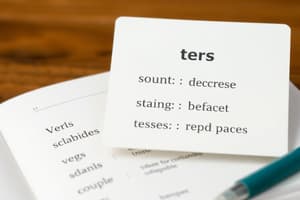Podcast
Questions and Answers
Which tense is used to describe an action, state, or event that occurs regularly or habitually?
Which tense is used to describe an action, state, or event that occurs regularly or habitually?
- Past tense
- Future tense
- Present tense (correct)
- Perfect tense
In which tense is the action described as taking place at some point in the past?
In which tense is the action described as taking place at some point in the past?
- Future tense
- Perfect tense
- Past tense (correct)
- Present tense
Which tense is used to indicate that an action, state, or event will occur in the future?
Which tense is used to indicate that an action, state, or event will occur in the future?
- Future tense (correct)
- Past tense
- Present tense
- Perfect tense
Which tense is often used to describe experiences or results that are ongoing or long-lasting?
Which tense is often used to describe experiences or results that are ongoing or long-lasting?
What type of truth or fact does the present tense indicate?
What type of truth or fact does the present tense indicate?
Which of the following tenses would you use to indicate an action you will perform tomorrow?
Which of the following tenses would you use to indicate an action you will perform tomorrow?
Flashcards are hidden until you start studying
Study Notes
Tenses: Understanding the Time Frame of Verbs
Verbs in a sentence help us convey actions, states, and events, and their role becomes even more nuanced when they are expressed in different tenses. Tenses are tools to indicate the time frame of a verb, allowing us to communicate about the past, present, and future with precision and context. Let's examine four fundamental tenses: present, past, future, and perfect.
Present Tense
The present tense describes an action, state, or event that occurs regularly, routinely, or habitually. It also indicates a timeless truth or fact.
- I study every day.
- The sun rises in the east daily.
- Water is essential for life.
Past Tense
The past tense shows that an action, state, or event took place at some point in the past.
- I studied last semester.
- The sun rose this morning.
- Water once flowed through this riverbed.
Future Tense
The future tense indicates that an action, state, or event will occur at some point in the future.
- I will study for the exam tomorrow.
- The sun will rise in the morning.
- The new bridge will be built next year.
Perfect Tense
The perfect tense shows that an action, state, or event has been completed or has been occurring over an extended period in the past. It is often used to describe experiences or results that are ongoing or long-lasting.
- I have studied several languages.
- The sun has risen every morning this week.
- The bridge has been under construction for years.
Combining Tenses
Tenses can also be combined in more complex ways to convey specific meanings. For example, the present perfect tense (indicating an action completed at an unspecified time in the past) and the future perfect tense (indicating an action completed before a specific time in the future) are just two examples of this type of combination.
Summary
Verbs in different tenses allow us to express the time frame of an action, state, or event in a precise and nuanced way. Understanding the basic tenses of present, past, future, and perfect will enable you to communicate more effectively and with greater clarity. As you continue to learn and practice using these tenses, you will find more opportunities to enrich your written and spoken language.
Studying That Suits You
Use AI to generate personalized quizzes and flashcards to suit your learning preferences.




